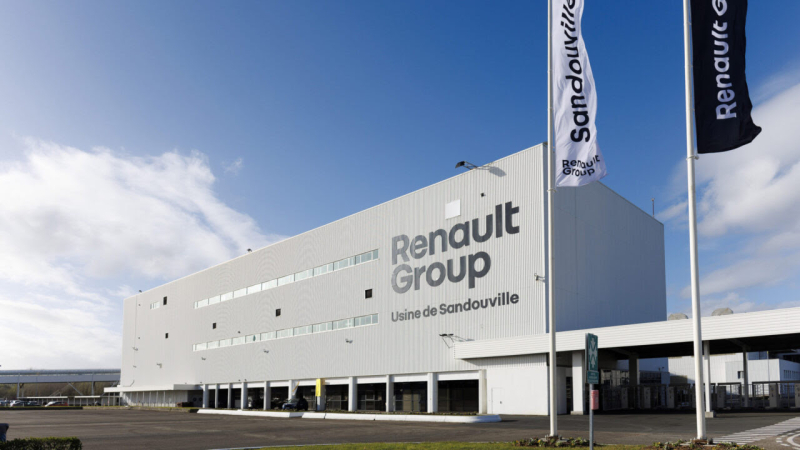Productie nieuwe elektrische bedrijfswagens van Flexis in Renault Group fabriek Sandouville
Renault Group announced today that the Sandouville site is to build a revolutionary generation of electric LCVs for Flexis SAS, the new joint venture set up by Renault Group, Volvo Group and CMA CGM. Marking the event, Luca de Meo, CEO Renault Group, and Thierry Charvet, Chief Industry & Quality Officer, Renault Group, welcomed Bruno Le Maire, Minister for the Economy, Finance and Industrial and Digital Sovereignty, and Édouard Philippe, Mayor of Le Havre and Chair of the Le Havre Seine Métropole urban community, to the Normandy site. The visitors were able to meet employees working on the assembly line. They praised the decision to locate this new industrial project in France and to recruit 550 people over the next four years.
Thierry Charvet, Chief Industry & Quality Officer, Renault Group: “The assignment of this new project recognizes the expertise and commitment of women and men at the plant. A new era is beginning at Sandouville, with the production of a new generation of electric LCVs that will transform the logistics of the future with their revolutionary design. This is a source of pride for us, and it is also a challenge that we are taking up at this historic site, where the objective is to remain an industry benchmark. With this decision, Renault Group is strengthening its industrial footprint in France.”
Sandouville, a benchmark in the production of LCVs in France
Reflecting the expertise and skills acquired by Sandouville in the production of LCVs over the past 10 years, the site has been selected to build a new generation of electric vans from 2026. This decision expands the strongly rooted industrial ecosystem established by the Group for the production of LCVs in France with its three plants: Maubeuge (Kangoo), Sandouville (Trafic) and Batilly (Master). The Sandouville site has built over 1,000,000 Trafic vehicles for Renault and its partners, in a full range of versions, from the platform cab to the Trafic SpaceClass.
A recruitment plan to boost industrial activity
To support this new activity and help the plant start the new project, a recruitment plan has been announced, with 550 new permanent and fixed-term hires over the next four years. This number is in addition to the 1,000 hires already recruited between 2014 and 2023. The plant currently has a headcount of around 1,850. At the same time, an ambitious training plan has been put in place, with over 21,400 hours of training in 2023, i.e. almost 18 hours per person.
An industrial site in a process of transition
The plant is stepping up its digital transformation and is committed to achieving net zero carbone by 2030.
With the deployment of the digital ecosystem Sandouville Plant Connect, the site workshops make maximum use of operational data, updated in real time, to optimise the value chain: from supplier management to production through to delivery to customers. Designed to oversee the various aspects of plant performance (quality, cost, lead times, energy use, etc.), this tool contributes to a more proactive work environment while promoting day-to-day excellence.
In pursuit of decarbonisation, the entire manufacturing process has been optimised to meet the 2030 target. Initiatives include a new, modernised painting process that will cut the use of resources and energy by 30%. The plant is also equipped with 40 hectares of photovoltaic panels.
Sandouville bodywork assembly plant
Ideally located in the region of Normandy, close to transport infrastructure, the Sandouville bodywork/assembly plant opened in 1964, and built most of Renault’s top-end vehicles (17 models) over a period of 50 years. Since 2014, it has specialised in the manufacture of light commercial vehicles. In 2023, the plant built 131,427 vehicles, adding Trafic Van E-Tech electric to its line-up. Three years ago, the Sandouville plant also introduced a policy of diversity and inclusion, primarily through the HOPE programme (Hébergement, Orientation et Parcours pour l’Emploi – accommodation, guidance and paths to employment), The objective is to help people with refugee status find long-term employment in France.







